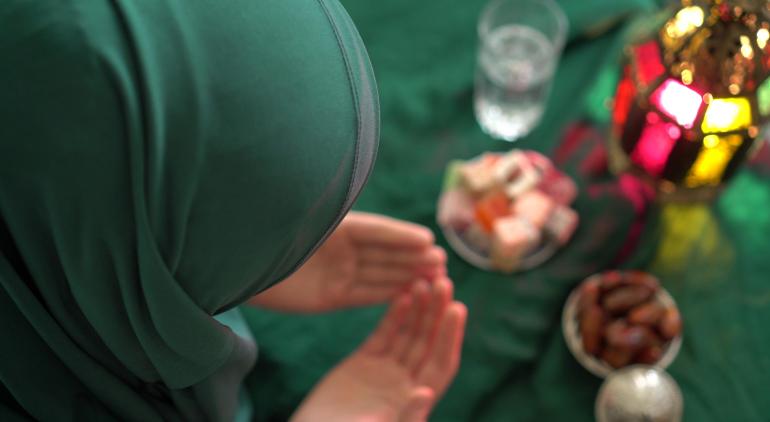
For Muslims worldwide, the month of Ramadan means 30 days of Sawm (fasting) during daylight hours, which means no eating and/or drinking from sunrise to sunset. However, as well as these Ramadan basic rules, there are others that the Islamic community is expected to abide by during this auspicious month.
Ramadan is one of Islam's five pillars and is considered the most spiritual month in the Islamic calendar, of which it is the ninth month. This is the time for Muslims to become closer to Allah (SWT) and to take the opportunity for reflection. Along with this tradition come Muslim Ramadan rules that must be followed to have a blessed Ramadan, which will please Allah (SWT).
Whether you are part of the Islamic community or not, the chances are that you will be well aware of the fast that comes with Ramadan. This is known as Sawm in Islam, and while abstaining from food and drink are the most widely recognised parts of the fast, these are not the only things Muslims avoid.
Whilst observing Sawm, some of the things that break your fast include:
On top of these, Muslims observing Sawm are also expected to refrain from anger, violence, lust, greed, and gossiping. The fast represents a period of deep personal worship in which Muslims seek increased closeness to Allah (SWT).
Not all Muslims are expected to observe Sawm, though. Children under puberty are exempt from fasting, although some parents encourage children (particularly older children) to fast for part of the day or on selected days. This is to prepare them for adulthood when they are expected to observe Sawm in its entirety.
Other exceptions include pregnant, menstruating, and breastfeeding women, the elderly (who are unable to fast safely), and anyone who has been advised not to fast on medical grounds (through ill health and/or medical conditions). Muslims may also be excused from fasting on selected days so long as they have a genuine excuse (such as travelling for an essential reason etc.) but will be expected to pay Fidya, which is a one-off payment equivalent to the value of feeding one person.
If a Muslim misses a day of Sawm for a reason that is not considered worthy, they must either pay Kaffarah, the value of feeding 60 people or observe a 60-day continuous fast outside of Ramadan. Muslims cannot begin their 60 days of fasting immediately following the day they miss as it is not permissible to fast over the Eid celebrations following Ramadan.
For many, things you can’t do in Ramadan leave some grey areas, often seeing Muslims going to their local imam for guidance and assurance.
Muslims will eat and drink at the pre-dawn meal, known as Suhur, and the evening meal, called Iftar, after sunset. Traditionally, the day's fast is broken at Iftar by eating dates, as it is believed that this is what the Prophet Muhammad (SAW) ate to break his fast. Although it takes place in the evening, Iftar translates to “breakfast” in Ramadan.
If a Muslim accidentally forgets to fast and unintentionally breaks it by eating or drinking, the fast is still valid as long as they continue to observe Sawm once they realise what they have done. They may choose to make a Fidya payment. However, should a Muslim knowingly break their fast without having a worthy reason to do so, the fast is invalidated, and they should pay Kaffarah.
Muslims are still allowed to wash by bathing and showering, but they should avoid swallowing water as this will break the fast.
Injections and Medication
You are still permitted to continue to take medication (such as pills and eye drops) and receive injections for medical reasons.
Vomiting
If a Muslim is sick and considered unable to fast, they are excused for doing so. Involuntarily vomiting, whether ill or not, will not invalidate your fast (as long as you do not swallow), but vomiting purposefully will be breaking your fast intentionally.
Muslims can brush their teeth during Sawm without breaking fast, as long as no water and/or toothpaste is swallowed.
Janaba
Janaba is a state of impurity following sexual activity or the completion of one's menstrual cycle and being in Janaba at sunrise will break your fast. Muslims must complete ghusl (full-body wash) before sunrise to avoid invalidating the day's fast. So, can you fast without ghusl? Yes, you can still carry out your day’s fast as long as you possess the intention to do so.
Donating Zakat ul-Fitr
As well as observing Ramadan Sawm, Muslims must also make the obligatory Zakat al-Fitr (Fitrana) payment, which is due during this month before Eid prayers begin. This is not to be confused with Zakat, which can be paid at any point of the year. Many Muslims make this annual payment during Ramadan, particularly in the last 10 nights for Laylat al-Qadr, due to the increased rewards and benefits.
Every adult Muslim with more food than their personal needs is obliged to pay Fitrana, approximately £5. This is the value of 2kg of rice or flour (or similar staple food), and all funds are used to distribute food to those most deserving. The head of the household is expected to pay Fitrana on behalf of any dependents, such as children and other relatives who do not qualify to make this payment.
Zakat Ramadan rules state that those who receive Fitrana must also qualify for Zakat, meaning they must fall into one of the eight below categories:
Supporters can make their Fitrana and Zakat payments through ILM by heading to our donations page. You can choose to make a general donation or ensure that your payment is used to support a specific campaign or appeal.